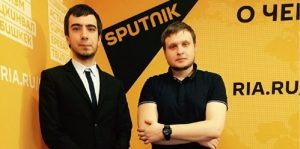They claim to have tricked the US Ambassador to the United Nations, presenting themselves as Poland’s Prime Minister. They have allegedly talked to the US Energy Secretary, claiming to be the Prime Minister of Ukraine. They seem to have made Spain’s Defence Minister believe she was talking to her Latvian counterpart. Even singer Elton John has apparently been targeted by the two pranksters, who have become celebrities in their home country, Russia, under their aliases, Vovan and Lexus, like reported by euvsdisinfo.eu.
But is what they do just entertainment, or are they also practising a form of propaganda? The fact that their phone calls receive frequent and substantial coverage by official Kremlin propaganda outlets like Sputnik, suggests that Russia’s authorities aren’t unhappy with their targeting of international politicians and decision makers.
Deniable propaganda
The two telephone pranksters are traditionally presented as comedians, and their recorded conversations as a form of political satire. The framing of their activities as entertainment can be seen as a way to safeguard their activity against serious criticism; for example, against questions about connections to government agencies, and whether such relationships are the reason why what they do is not only tolerated by the authorities, but communicated uncritically by the government’s own media. The use of satire relates the telephone pranksters to another case of apparently humoristic entertainment, the popular television comedy show KVN, which has been criticised for containing propaganda messages and for targeting its writers with censorship.
Importantly, the Russian pranksters don’t pass one of the most fundamental tests of telling what qualifies as propaganda or not. And in this one-sidedness they share a feature with official Kremlin propaganda outlets, such as RT (Russia Today). That test is that they will never target anyone from the political establishment in Russia. Nobody from the establishment has ever received a phone call from them. As the pranksters told The Guardian: “We wouldn’t prank Putin. We don’t want to harm our country. We don’t want unrest here; we don’t want to do anything that would help the enemies of Russia.”



